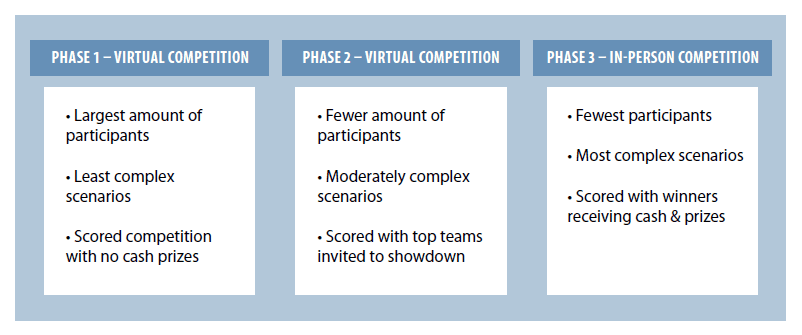The Air Force is looking for innovative ways of doing business, and there’s no lack of options. Event-based collaborations are being utilized to speed up everything from the SBIR process to rapid prototyping. Two very popular choices, familiar to industry and the DoD, include Open Innovation Challenges and Hack-a-thons.
When DSTL toured WBI facilities during the summer of 2018, there was a shared desire to collaborate and do it quickly. Most international collaborations take months or years to plan, but speed was essential. Conversations throughout the summer revealed a similar need from both laboratories to find innovative ways of controlling swarming drones. But how could an international collaboration yield actionable results with months-long planning cycle?
WBI took the best of Open Innovation Challenges and Hack-a-thons to create Stagegate Challenge, a unique challenge model that provides a strategic, stair-step approach to finding investable solutions. Event-based challenges provide a great opportunity to collaborate and rapidly construct solutions, but they rarely turn into products or capabilities in which the Air Force can immediately invest. Stagegate Challenge closes those gaps by utilizing a phase-based approach, that increases in complexity, which helps narrow the field and examine the investment options before the in-person event. WBI put this model to the test for the Swarm and Search AI Challenge: 2019 Fire Hack Showdown Event, hosted on March 29-31, 2019. A concurrent event was held in Southhampton, United Kingdom at Solent University, run by DSTL, that followed a traditional Hack-a-thon model.

WBI utilized the Stagegate Challenge framework in collaboration with AFRL, DSTL and UDRI, to construct fire mapping scenarios that would allow non-military teams to participate. Nine teams, comprised of small businesses and students, with 39 participants converged at WBI’s 444 E. Second St. facility to tackle swarming drone scenarios using AMASE simulation software. Each team used a variety of strategies and adapted quickly in the increasing complexity of each scenario. As one participant said, “One thing that surprised me is that it feels like we’re all helping each other so much. I really like the collaborational spirit of the competition." Over $65,000 in prizes were awarded across four rounds.
What really separates Stagegate Challenge from traditional models is identifying the acquisition channels, prior to the beginning of the challenge, to help promote investment in the solutions. At the end of May, AFRL attend the AUVSI conference in Chicago, ILL and featured the winners to the largest UAV audience in the world. AFRL cross-directorate research teams were offered funding to continue working the solutions. Finally, AFRL and DSTL will present winning solutions at the UK embassy in Washington DC this June. With acquisition and research channels in place, WBI can help the Air Force capitalize on these solutions, with the plan to transition built into the process.
The Stagegate Challenge framework will be utilized in 2020 collaborative events, with an emphasis on refinement and customization, based on client needs.
